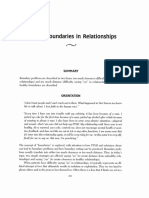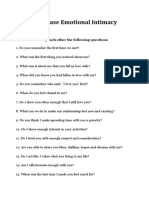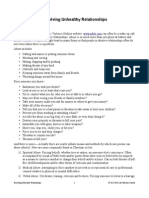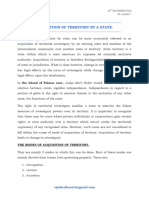THE RULES OF
FIGHT CLUB
DR SUSAN KRIEGLER
�THE SERMON
The Rules of Fight Club were formulated by observing how couples who are still in love after many years approach conflict . The rules are based on the understanding that hurting your partner is really hurting yourself . This is illustrated in the movie Fight Club. At the end of the movie it is revealed that in reality there had been only one person all along who thought he was beating up an adversary, but in reality he was only punching and kicking himself. Although they are counter-instinctive, these are the universal principles of constructive conflict resolution and they are in fact applicable to any conflict situation. Even two people who start out really adoring each other, will have issues. However, if their differences are not resolved, these issues pile up and over time a few molehills grow into a huge mountain of frustration and resentment. Because most people lack the skills of constructive conflict resolution, they argue and an argument easily escalates into an ugly fight. The hurtful things said and done during fights then become the fuel for further fights. The original issue that sparked off the fight is soon forgotten, but the anger and hurt generated by the fight linger on and erode the fabric of the relationship. It is important to distinguish between the primary issues in a relationship (chores, responsibilities, money, leisure, sex, etc) and the secondary issues which are the result of the destructive way a couple attempts to or fails to resolve the primary issues. If a couple adheres to the rules, not only will the original issues be resolved, but the deeper wounds that result from personal attacks, verbal abuse, spiteful and even violent behaviour secondary issues - will be avoided. If a couple succeeds in resolving their differences as they arise, their friendship deepens. Their self-esteem is raised as they develop a sense of pride in the success of their relationship. Applying the rules is not easy. You will need to change your old habits and learn to approach differences in a much more thoughtful way, until the rules become automatic. You will need to unlearn the survival strategies you saw your parents use and the defensive mechanisms you learnt during childhood, e.g. avoiding, or the suppress-explode-withdraw cycle. You will need to overcome your ego and the primitive, automatic fight-/flight-/freeze response. This demands a great deal of discipline and self-mastery. This results when a relationship is seen as an opportunity for your not your partners growth towards emotional maturity and the development of character. A beautiful relationship is the result of wisdom, restraint, responsibility, gentleness, compassion, sensitivity, humility, generosity, e.g. being a beautiful person on the inside. If physical beauty were the prerequisite for amazing relationships, there would have been no divorces in Hollywood! To see your conflicts as opportunities to develop loving and loveable qualities in yourself, instead of blaming your partner for his/her lack of them, is the starting point for constructive conflict resolution and lasting love. Making your partner wrong and proving yourself right will never get you the love you want. You need to decide: Do you want to be right or do you want to be happy? If you want to be happy, and if the relationship is worth it, how about trying out the rules for a while? After all, what have you got to lose?
�Remember Einsteins definition of insanity continuing to do the same thing and expecting a different result! What if your partner is not interested in these ideas? Making your partner responsible for your immaturity or bad behaviour is really a recipe for remaining a child. You are free to be the person that you can admire when you look in the mirror in the morning. If you implement the rules and grow into the person you want to be, your self-esteem and inner peace will increase, and who knows? your partner might just begin to take some cues from you. If you stop fighting or withdrawing and demonstrate the behaviour and attitudes you wish your partner would adopt, chances are that they will. O.K., thats the end of the sermon, so here are the rules:
THE RULES
RULE NO 1 ONLY BY APPOINTMENT Never rush into a discussion about an issue while you are upset or angry. You need time to calm down, reflect on what you are going to say and how you are going to say it. The cooling down period is absolutely necessary. You need time to consider whether the issue is worth mentioning at all. So often a huge fight is caused by a minor frustration, or something that you see in an entirely different light when you are no longer upset. Often the reason for a fight is entirely forgotten the next day, but the damage to the relationship is permanent. Perhaps a day or two of reflection brings you to the realization that its not even your partners is sue, but a long-standing pattern of your own an issue that youve had since childhood. Perhaps you realize that its something your partner cant do anything about. Your partner also needs time to prepare her-/himself for the conversation. Timing is important. Dont spring a fight on your partner when they are tired, hungry, pre-occupied, or busy with something else. Alcohol is a definite no-no. Try to avoid your bedroom, which is your sacred space for rest and lovemaking. Use the kitchen, dining room, or study and ensure privacy from children or other family members. Make an appointment by saying something like, Honey, there is something that is important to me that I would like to discuss with you. Would you set aside half and hour for me on Saturday morning after breakfast before you go to golf? If you follow the rules, you should lose the fear of discussing contentious issues. The conversation should not exceed 10 to 20 minutes. If it
�takes longer than that, you are doing something wrong and you should reschedule for another time. The appointment should be kept within 24 to 48 hours of the request. While you are waiting for your appointment, please dont sulk or punish your partner in any other way. Always maintain the minimum standards of civility, courtesy and friendliness in your day-to-day interactions, even if something is bothering you. Taking turns is important. It should work out about 50/50 in terms of who is the aggrieved (the talker) and who is the accused (the listen er). But what if one of you is always the one who has an issue and the other is always in the dog house or frantically avoiding communication about anything unpleasant? If this is the case, you should consider the following possibilities: There is something fundamentally wrong in the basis of your relationship. Couples counselling is probably needed. It may be a case of unrealistic expectations. Individual counselling or therapy will need to address this. Perhaps the person who is constantly aggrieved or desperately avoiding / escaping is stressed, anxious or depressed and projecting these problems onto the relationship. You cannot expect to be happy in your relationship if you are unhappy in yourself. Again, get yourself into therapy. Resources available in the practice include the following: Books: Couples Workbook: Creating the Love You Desire Singles Workbook: Finding Yourself and the Love You Want How to Beat Stress: The Mother Of Anger, Anxiety, And Depression CDs: Beautiful Relationships Freeing Yourself From The Unspeakable Anger, Jealousy, Rage Healing Through Light And Love On Commitment On Intimacy Stop Feeling Not Good Enough The Sacred Journey
RULE NO 2 A SPOON FULL OF SUGAR MAKES THE MEDICINE GO DOWN One of the reasons you have to think before your fight club appointment, is that you should remind yourself of all the good things in your relationship. This helps you to calm down and get things into perspective. This also enables you to open the conversation with words of love an d appreciation, e.g. Sweetie, I love you very much and I really value our relationship. I admire you and I enjoy the things we do
�together. I particularly appreciate how hard you work / what a wonderful mother you are to our children / that you are an amazing lover / my best friend. This will help to create the kind of atmosphere where your partner does not feel unfairly attacked and hence able to really hear what you have to say. Remember you dont catch bees with vinegar. Honey is a better idea. You cant get a person to love you more by making them feel guilty or bad about themselves! This may work in the short term, but your partner will gradually fall out of love with you if they are always made to feel bad about themselves around you. The trick is to build your partners confidence in their ability to make you happy and satisfy you. It is easier to be in love with a person who sees you as an angel, than to be in love with a person who is an angel and sees you as the devil! Also try to end the conversation with some praise or recognition, e.g. Thank you for listening to me. I want to tell you again how much I appreciate all the wonderful things you already do for me, especially that you never stay out late / look after your body so well / bring me coffee in bed, etc. Name at least one specific example so that your partner may feel that you do notice. Beginning and ending the conversation with love, praise and recognition, is sometimes called the principle of the appreciation sandwich.
RULE NO 3 ONLY ONE ISSUE AND ONE SPEAKER PER APPOINTMENT How do you eat an elephant? One bite at a time! You need to limit the conversation to only one issue and stick to that one issue until it is resolved. I have seen marriages crumble when issues are accumulated and brought out in a deluge of complaints and accusations. The 20-page letter listing all you partners transgressions and flaws is a definite no-no. The whole idea is containment. If its small enough it can be handled. Hopping from one grievance to the next in order to prove just how much you give and how little you get back in return or how wronged you are, will definitely only serve to overwhelm your partner. The most likely responses will be, You are just never satisfied, You are such a negative person, Nothing I do is ever good enough for you, or Why dont you just pack your bags and find somebody who can make you happy? There can also be only one speaker and one listener per appointment. We can only deal with one issue at a time! If the listener responds with Yes, but what about my needs, I will do that if you, You do exactly the same thing, I only do that because you, an argument will definitely ensue.
�This is perhaps the rule that people have the most difficulty with. They always say, But when do I get to state my side of the case? or Cant I just explain how I see it? or When do I get a chance to say what I need? The point is that as your partner gets a sense of being heard, understood and attended to, they will in their turn be more willing to also listen to you. But you must wait for your turn. Make a subsequent appointment. However, please dont abuse the next appointment by just using it to continue the argument or state your side of the issue. Wait a week or two, do what your partner requested of you and then see if you still need to say a few things just to prove that you were right and they were wrong! This kind of cheating will only defeat the object of the whole exercise.
RULE NO 4 STATE THE ISSUE DIRECTLY AND SIMPLY IN A NEUTRAL WAY When you announce the issue you want to discuss, do so as directly and as simply as you can. Say exactly what you mean. Say, I want to talk about us going out to dinner / to the movies. Dont say We only do what you want to do , or You dont care about the relationship anymore. If its about your sex-life, say I want to talk about our sex-life. If its about your finances, say I want to talk about our finances / how we split our financial responsibilities. Dont accuse or character-assassinate your partner. Dont say Youre selfish / lazy / inconsiderate / irresponsible / uncaring / cold / a pathetic father or lover. If its about washing the dishes or taking out the trash or fetching the kids at school, say it. Dont make a long story about the facts of the matter. This may start an argument because your partner may counter with Thats not true. I came home before six twice last week, or I havent played golf more than three times this year. Dont exaggerate, dramatize, or generalize. Avoid words like always or never. Dont say You come home late every night, or You always put me down in conversation. Dont say We never have sex anymore, if its not literally true. RULES NO 5 & NO 6 FOCUS ON YOUR OWN FEELINGS & NO MIND-READING! After you have announced the topic, tell your partner how you feel about the issue at hand. Dont tell him/her how you think they feel or think, e.g. You dont care about my feelings / dont think I am important / dont care about the house. The trick is to express your own feelings in such a way that you dont attack or accuse your partner. Dont say You hurt me, rather say I feel sad when you Dont say You humiliate / ignore / neglect me. Rather say When you I feel
�afraid that our relationship may end, or I feel lonely and lost when you Dont say I feel that you dont value me. You need to learn to use emotionally non-violent language. Dont use words that imply an accusation. Dont say I feel abandoned / rejected / unsupported this kind of statement always implies by you. Rather say I feel overwhelmed / frantic / anxious / insecure. Dont use words that make you a victim. Dont say You dont make me feel attractive / like a woman, or You make me angry, or You irritate me. That makes your partner responsible for your feelings. As an adult you always need to assume responsibility for your own feelings. Avoid words like angry or irritated. Anger is always a cover-up for a primary emotion, e.g. fear or sadness. Get in touch with the real feeling underneath the anger or the resentment before you make your fight club appointment. Try to communicate your feelings in such a way that your partner is able to empathize with you, but dont play the martyr. Dont say I feel like I am only good for bringing home the money, I can never earn enough to make you happy and Ive probably got an ulcer. But then, you dont care, do you? All you can do is lie around at home all day and think of more ways to spend money on your hair and nails. Rather say Honey, I really need you to understand that I feel overworked, overburdened and stressed out. It feels like I am constantly rushing around, I forget things, Im always late, I cant switch off my mind. I worry about my health, I have difficulty sleeping at night and my stomach burns when I try to balance our accounts. RULE NO 7 LISTEN!!!! All the previous rules apply to the one who has the problem, e.g. the speaker. Now we get to the difficult part for the one who needs to receive the message. It is easy to be a good listener when the accused in the issue is not you. The first part of effective communication is delivering the message in such a way that it can be heard. But the art of listening is really where its at.
�If you are at the receiving end of fight club, this is where you need to keep your wits about you. You need to breathe deeply, relax, and really hear your partner. Do not defend, explain, justify, minimize, invalidate your partner, or counter-attack. Any attempt to state your side of the story will only result in the speaker feeling unheard and invalidated. This will make them feel even worse than they already feel about the issue under discussion. In essence, what they are trying to get across is that they feel unloved. If you defend, explain, justify, disagree, minimize, counter-attack, or otherwise make them wrong, you are deepening their sense of being unloved. This is when they will stack up more facts to prove their case, exaggerate, get frustrated, shout, cry, swear, storm out of the room, etc., thus escalating the original issue to a whole new level. If you dont listen, you are only confirming what they are trying to say to you in the first place. Its really about learning not to invalidate your partners feelings. To invalidate means to make wrong. By not listening and not honouring their feelings, you are really saying to your partner that their feelings and they are not important to you. If you argue, you may as well say it straight out: You are wron g, bad, dumb, stupid, or crazy! Remember, you dont need to agree with the facts of the situation to understand their feelings. If there is a conflict, by definition it means you dont agree with how they see the facts. But if you want the love to last, you need to empathize with their feelings. Feelings are always valid and true. If you devalue or trash your partners feelings, you are systematically destroying the very fabric of you relationship. After all, what is a relationship? It is woven out of the feelings you have and share. Hearing and understanding is the first part of listening. The second part is to communicate that you understand. Its no use understanding if your partner doesnt feel and experience your understanding. So, what you need to do, is to mirror your partners feelings. Mirroring means that you repeat what you heard your partner to say, using your own words. You may even elaborate a little on what you heard, to help the speaker to feel fully understood and validated. You may say something like, Sweetheart, what I hear is that you feel overwhelmed overworked, unsupported and very lonely when I. Am I hearing you correctly? You need to keep on mirroring until your partner indicates that they feel satisfied that you have fully received the message and indeed understand their feelings. If you watch your partner, you will see them relax at this crucial point in conflict resolution. Their facial expression and body language will change, they may sigh, or say Mmm. These are signs of the endorphin response that is universal in humans and animals when they feel loved. You have done your part. You have listened and communicated your understanding. Now you may proceed to the next step, which once again puts the ball in the speakers court.
RULE NO 8 CONCENTRATE ON SOLUTIONS
�Now the listener asks what they can do to make it better / solve the problem. The question is, Honey, I really dont want you to feel that way. What can I do to make that better for you? This phase of the process is another reason why the speaker needs to prepare for the conversation. If you didnt think about it beforehand, it i s often impossible to formulate realistic, concrete, fair, feasible, and positive behaviour change requests. The requests may sound something like this: I would really like you to take me out to dinner once a week and pay for it, or I would love it if you would kiss me on the mouth and hug me when you come home in the evening, or I would really appreciate it if you would call me if you are going to come home late, or I would like you to sit and chat with me for half an hour every evening after sup per. It is against the rules to say Just dont do again, (negative) or Wont you just be more considerate, (vague) or Please dont ever make me feel insecure, (just impossible!) or Make love to me five times a day every day (not realistic?). You need to think carefully about your requests. Think about those differences that will really make the difference for you. Be creative think outside the box. You may be pleasantly surprised to discover that the crucial changes that really make the difference are often really small behaviours, like a daily compliment, or taking out the trash, or carrying the groceries from the car. Remember that these are requests, not demands. We need to learn to ask for what we want, but we also need to accept a no. It may also be a good idea to present your partner with a list of possible solutions to your problem. This reenforces the fundamental principle of freedom of choice in a loving relationship. If you are the listener, you are free to grant your partners requests or not. You dont need to provide reasons for the requests that your refuse. This may lead right into another argument. However, it is recommended that you listen creatively. This means that you get the drift of what your partner is requesting and think of other things you may do to make them feel more loved. After all, it is in your own best interest to make your partner happy. This is an investment in your own happiness! But be careful not to promise anything that you are not really going to do. This will again defeat the purpose of the exercise and lead to deeper problems. If you are the speaker, graciously accept your partners gift of requests granted. Even if you are not fully satisfied, say thank you and give them a hug. Both the speaker and the listener should cut your losses, count your blessings, and get on
�with the task of being the mature, happy and loving person that you were created to be.
FEAR DESTROYS LOVE To feel love freely and joyfully, we need to push through our fear of loving. Think of it in this way: Fear causes us to protect ourselves. Love requires us to become safely vulnerable, in the knowledge that we can handle whatever happens. Fear is rigidly holding on in desperation. Love is relaxing and letting love flow. Fear causes us to close out hearts. Love is about opening our hearts. Fear causes us to always put ourselves first. Love is knowing when and how to put our loved one first. Fear creates judgement. Love creates compassion. Fear creates blame. Love requires that we take charge of our thoughts and actions and change what doesnt work for us. Fear creates anger, discord and coldness between the sexes. Love creates a feeling of harmony, warmth and love.
LOVE LESSON Use the following affirmations at least ten times three times a day, to help you push through the fear of loving and being loved: I am powerful and loving and I have nothing to fear. Whatever happens in my relationship, I will learn and grow from it.
CHOOSING LOVE, NOT FEAR The Talmud says, We do not see things as they are, we see things as we are. Through these practices you may come to understand that perception is not a viewing of an objective external reality, but a projection of what is inside us. As THE COURSE IN MIRACLES points out, Projection makes perception. This means that
10
�the thoughts and beliefs inside of us are projected outward, colouring our perception of the outside world, its events, and our relationships in it. How we perceive things does more to determine our personal reality than anything else. It is not what another person says or does, nor the events of life that make us happy or unhappy, but rather what we think about that persons behaviour or those events.
For example, two children raised in the same family can grow up with very different perceptions of their family life. One takes the mothers guidance and nurturance as helpful and loving, thereby becoming open to learning from adults and authority figures. The second child takes her mothers guidance as intrusiveness, thereby growing up to resent and question authority.
Most of us have had the experience of looking at the world through depressed eyes. Everything looks bleak, helpless, and hopeless. On the other hand, with nothing outside having changed, if we view the world through happy eyes, begin to have happy memories or entertain a loving thought, then everything becomes bright and hopeful. The only change has been the thoughts in our minds, yet our whole world is now different. Making a perceptual shift requires that you take response -ability for your thoughts, feelings, behaviours and the characteristics of your relationship. Its up to you make this choice moment by moment. And essentially, making a perceptual shift enables you in an instant to choose love instead of fear. In order to make the perceptual shift in the moment of interaction, you need to think of all emotions as being distilled down to two basic ones: love and fear. All the positive emotions, such as joy, happiness, delight, and affection, grow out of love. Negative emotions, such as anger, jealousy, guilt, envy, hurt, and rage, all grow out of fear. In fact, the more intense or pervasive the negative emotion, the greater the fear that gives rise to it, no matter how bizarre, difficult, obnoxious, or vicious the person might be. In fact, the more obnoxious or vicious they are, the greater is the fear that gives rise to it. You will commonly find such irrational and excessive outbursts in the borderline personality, who lacks confidence in his or her ways of coping. The extreme manifestation of such fear is in the paranoid schizophrenic or the paranoid character. Fear, being of the ego, which is driven by the power of our childhood vision of the world, is the world of illusion, but we experience it as true every time we are afraid. We are not always aware of being afraid. In fact, an angry person will often deny fear, rather than seeing that his anger is just a defence against fear, and fear is then a defence against love. But if we are able to look with X-ray vision, and see past the surface behaviour of the person (or ourselves), and see the fear that lies behind it, an important step has already been taken away from victimization. Marriage can be a place for the greatest psychological and spiritual growth. Why is this so? The daily give and take of marriage evokes all of our deepest conflicts, our ego issues, and our childhood yearnings and traumas. Power struggles are frequent as well as challenges to our values and habits. Sexual and
11
�other needs vary from our partners. Our old beliefs influence how we perceive and interact with our partner. Our attachments come in direct opposition to what our partner may be attached to. The marriage will heat up these issues like a steel mill heats up iron ore and brings the impurities to the top so that they can be skimmed off. With iron ore, the heating continues and becomes more and more intense, bringing more and more impurities to the top to be skimmed off. Eventually, the result is pure strong steel. This metaphor is extremely useful when dealing with any challenge or difficulty in a marriage. In a spiritual relationship, we learn to look at problems as opportunities to learn about ourselves especially our barriers to love instead of getting stuck in conflict and struggling to resolve issues. We learn to access our god self essence (love) and naturally become more centred, more at peace, and more loving. In this way, we are more able to see the preciousness of our partner with deep appreciation, for that partner is necessary for our discovery of our essential nature and spirit. We reach heaven on earth in the marriage by going through the difficult challenges the human ego presents to us, and then learning to transcend this limited ego perspective. Sometimes our partner will be healed along with us as we heal our own minds. Other times, only seeds may be planted that may or may not sprout in this lifetime for us to see. But even if our partner is unable or unwilling to give or respond with love, we can still find increased inner peace, happiness, and love within ourselves more of the time, whether we choose to stay married to that person or not. Everybody longs to find their Soul Mate. In order to deflate our overblown idealizations of love that are unattainable, spiritual teachers say that the chance of finding your Soul Mate is one in a few hundred billion. So perhaps you can console yourself with the fact that you are with someone elses! You may not find this joke funny. To be serious, the truth is that you find your Soul Mate in the process of loving. It doesnt happen all at once as weve been led to believe. It takes a while for true Soul Mate status to be conferred. Before the beautiful bond between two souls can be created, you have to go through the difficult times. You have to appreciate the wonderful times, work through your differences, learn to communicate with love, and lighten up and laugh at our humanness. You will never get to Soul Mate status unless you live primarily in the realm of the soul. You have to become someone who lives in your soul your Higher Self. That is the part of you that is truly loving, caring, joyful, appreciative, respectful, kind and giving. IMAGINE AND FOCUS FIRMLY ON WHAT YOU WANT. Ask and it shall be given means its all about attitude. Keep your eye fixed on the heaven you desire. Turn your face to the sun and the shadows fall behind you. (Maori saying) HOW AWARENESS WORKS
12
�WHAT YOU FOCUS ON, WILL MANIFEST AND INCREASE SOUL SELF SPIRITUAL KINGDOM ETERNAL REALITY KNOWING / FAITH PEACE / FORGIVENESS PERFECTION JOY HEALTH / WHOLENESS ABUNDANCE FREEDOM / FREE EASE / FLOW LOVE / ONENESS ego self material / sensory world / tangible temporary / mortal illusion / changeable thinking / senses / reason conflict / anger / criticism duality / error / accident pain / injustice disease / brokenness limitation / poverty / lack trapped / expensive struggle / difficult fear / hate / separation
There is another way to formulate this fundamental principle of life. You cant have anything if you fear or hate its opposite . Its a question of focus. Whether it is positive or negative, what you focus on will appear (for you) and it will persist and increase. As the saying goes, What you resist, will persist. What you fear and hate, will appear everywhere. If you fear crime, or disease, or injustice, you will notice and perceive it everywhere, even where it does not exist. This is what you will notice when you open the newspaper or switch on the TV. And before you know it, you begin to attract and create the very thing you abhor. To focus on and be grateful for what is already present in your life, is undoubtedly a key to the kingdom of peace. And there is no better way to demonstrate gratitude and to manifest abundance than by sharing what you have with others. Remember the power of positive thinking. You can be, have and do anything your really, really, really want. That means you need to be able to visualize it, say the words to call it into being, and whole-heartedly intend it for yourself. The Bible tells us that in the beginning there was only darkness in the universe and chaos upon the void. God looked upon this and said, Let there be light! She did not complain about the mess and look for somebody to blame or to clean it up. If she had done any of these things, we would still be sitting in the dark! She created something else. But to do so, she had to imagine vividly what the light would look like. She had to have a word for it. She had to realize her power and have a pretty clear intention to create what she wanted instead. To think positively is not only a gift to those around you, but also a way of loving yourself. However, it is important to remember that love brings up anything unlike itself. Since doing positive thinking is a way of loving yourself, anything in the way of having that new result in your life will present itself to be dealt with. If you hold on to your positive vision of the person you want to be and the relationship you desire to create, the resistance will be dissolved, the vision will eventually be integrated into your consciousness and will manifest in your world. Think positive thoughts about your partner and loved ones. Holding on to negative thoughts about them only fortifies their negatives.
13

























































































